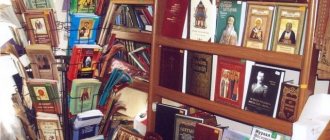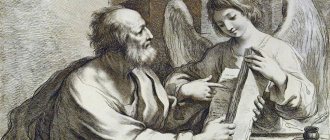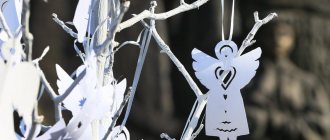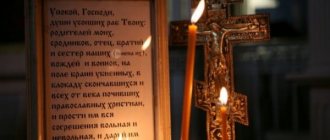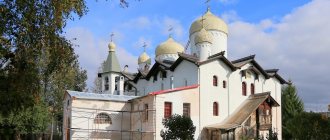Mark is one of the seventy apostles. Those who preached Christianity in the 1st century. The biography of Evangelist Mark includes many travels related to missionary work. The life of the saint is known from the texts of the New Testament and the testimonies of ancient writers. The saint was present at the arrest of Christ and will transfer memories of this to the pages of his Gospel.
Painting by artist Valentin de Boulogne “The Apostle Mark”, 17th century
Matthew, Luke, Mark, John are the holy evangelists whose books were included in the New Testament. Preaching Christianity, everyone except John suffered martyrdom. Saint Matthew is considered the author of the first Gospel.
The biography of Evangelist Mark includes many travels related to missionary work. Apostle Luke was the first icon painter. Saint John wrote five books for the New Testament.
Who are the apostles? 12 disciples of Christ
The son of Paul and Mary, the future apostle Mark, was born in Cyrene (modern Libya). Soon after his birth, the family moved to Jerusalem. Upon his birth, he received the double name John-Mark. John is a Hebrew name, Mark is a Latin name.
The apostle came from a family of priests, from the tribe of Levi. He was born into a wealthy family, which provided the saint with a good education. He studied Hebrew, Greek, and Latin.
In Jerusalem, Mark's mother, Mary, becomes one of the first followers of Jesus Christ. Christians who believed in Him gathered in her house, so Mark joined the community of Jesus as a young man. There is a legend that the Last Supper itself took place in the house of Mark’s mother.
"The Last Supper" by Leonardo da Vinci. According to legend, it took place in the house of Mary, mother of Mark
Later, when the apostle writes the Gospel, in the story of the arrest of Christ he will mention one young man. According to legend, Mark is believed to be describing himself.
“One young man, wrapped in a veil over his naked body, followed Him; and the soldiers seized him. But he left the veil and ran away from them naked.”
(Mark 14:51-52)
Pavel Popov, “Taking Christ into custody.” A naked youth running away from the guards - seventeen-year-old Apostle Mark
After the ascension of Jesus to heaven, during the persecution of Christians, the house of the saint’s mother served as a refuge for some of the apostles. It also became a temporary home for the Apostle Peter, who later experienced warm fatherly feelings for Mark and called him “my son” in his letters. And Saint Barnabas, who was Mark’s uncle, introduced his nephew to the Apostle Paul.
Apostle Barnabas, uncle and closest friend of Saint Mark. We preached Christianity together for several years
In the early 40s. Barnabas takes his nephew on a missionary journey led by the Apostle Paul. Together with them, Saint Mark was in Seleucia, then set off on the journey to the island of Crete. His apostle walked all the way from east to west. From there he went to Jerusalem, and then visited Rome with the Apostle Peter.
The Apostle Peter was Mark's teacher. During his missionary work in Rome, Mark was his translator and assistant in the formation of the Christian community
In Rome, Peter and Mark found an already existing Christian community. The Apostle Peter multiplied the Roman church with his word and miracles, and Mark became his right hand. Mark acted as an interpreter between Peter, who spoke little Greek, and his listeners.
Saint Mark carried out his missionary work among the Jewish diaspora in Rome, which numbered about 45 thousand people.
4 evangelists
It was in Rome, according to many, that Mark wrote the Gospel for the pagans and those who believed in Him. Church writers of the time testify that the Gospel of Mark is a record of Peter's stories. Peter himself will confirm the accuracy and truthfulness of the book compiled by Mark and approve it for reading in the churches.
Gospel of Mark, first page in handwritten version
At the behest of his older friend and comrade, Mark went to Egypt.
In Alexandria the saint founded a church and became the first bishop of Alexandria. In this city, the apostle compiled the rite of the Liturgy for Christians and actually created the church hierarchy. In Alexandria, he founded a school, from which such famous church fathers as Gregory the Wonderworker, Clement of Alexandria, St. Dionysius and others subsequently emerged.
Clement of Alexandria was educated at a Christian school founded by St. Mark
The Liturgy of St. Mark is a classic example of Alexandrian worship. Due to its brevity and clarity, it was popular in many places in the Christian world until the 12th century. Then it was supplanted by the Liturgy of Byzantine origin.
After the evangelist Mark laid the foundations of the church, many Egyptians abandoned paganism and embraced Christianity, which caused concern in Rome.
Mark is the first bishop and first martyr of the Alexandrian Church.
On April 25, 68, the holiday of Holy Easter coincided with the celebration in honor of the Egyptian god Serapis. On this day, the pagans seized Mark in the temple during worship, beat him and threw him into prison.
The next day, a rope was tied around the saint’s neck, and the other end was tied to a bull. The animal was driven through the streets all day. The wounded Mark was dragged along the ground behind him. By evening, all the streets of the city were covered in the blood of the apostle. Then he was untied and put back in prison.
Martyrdom of Saint Mark. The pagans tied Mark up and dragged him through the streets of the city for several days.
At night, Jesus appeared to Mark and said that he would die tomorrow. In the morning the torture was repeated. The bull dragged the saint on a rope until his head was torn away from his body. Then the Christians took the body of the Holy Apostle and his head and buried it. In the 4th century AD. A church was built over the tomb of St. Mark.
Gospel of St. Mark
Mark, Luke, Matthew, John are the holy evangelists whose books were included in the New Testament. Preaching Christianity, everyone except John suffered martyrdom.
Evangelists. From left to right, top to bottom: Matthew, John, Luke, Mark
The Gospel of Mark is the second book of the New Testament. But some contemporaries believe that the Gospel of Mark was the first of the canonical Gospels and became the basis for writing the good news of Luke and Matthew.
The Gospel was written around the 60-70s.
The Holy Gospel of Mark is the shortest of the four. It is divided into 2 parts and consists of 16 chapters. It was written in Greek and in a colloquial style. The first eight chapters show stories of Christ's miracles to prove that he is the son of God.
For this reason, the lion was chosen as the symbol of St. Mark. The lion rises above other animals, just as Jesus Christ is presented in the Gospel of Mark as omnipotent and royal.
The Apostle Mark and his symbol is the royal lion. This is exactly how Mark described Jesus in his Gospel: omnipotent and all-powerful.
There are two versions of the place of writing - Rome and Alexandria.
Back in 200, Clement of Alexandria declared that the apostle’s good news was written in Rome. There are a number of factors that confirm his words:
- Mark is the only evangelist who uses several typical Roman words in Greek.
- The apostle uses Latin words and expressions that were used in Rome.
- The Gospel of Mark contains no details of Jewish life.
- Uses the Roman time system.
- The Gospel is written in Greek to reach the largest possible audience. At that time, Greek was considered an international language.
In the Gospel of Mark, more attention is paid to the actions of Christ, and not to his speeches. The resurrection of Christ and the meeting with the disciples in Galilee are written with special feeling.
“Finally, he appeared to the eleven themselves, who were reclining at supper, and reproached them for their unbelief and hardness of heart, because they did not believe those who saw Him risen. And he said to them: Go ye into all the world and preach the gospel to every creature.” (Mark 16:14-15)
Purposes of the Gospel of Mark:
- Evidence that Jesus Christ is the son of God.
- Strengthening the faith of newly converted Christians and instructing them.
- Attracting new followers to the Christian faith.
But also for the first generations of Christians it was important not only to show the divine level of Christ, but also to insist that he was a man, otherwise his suffering was ridiculous. In the second part of the Gospel, Mark describes the words of Jesus explaining the need for atonement for human sins by death on the cross.
Apostle of the 70 Mark the Evangelist, Alexandria, bishop
Life and works of the apostles - Holy Apostle and Evangelist Mark
Brief life of the Apostle and Evangelist Mark
Born in Jerusalem, nephew of the Apostle Barnabas. On the night of Christ's suffering on the cross, he followed Him (Mark 14:51-52). Disciple of the Apostle Peter. Founded the Church in Egypt, was the first bishop in Alexandria. Here he laid the foundation for a Christian school. Preaching the Gospel, he traveled to Libya, Nectopolis, and visited the interior of Africa. Visited the Apostle Paul in Rome, where he was in prison. According to legend, here the Apostle Mark wrote the Gospel for the pagan believers.
Ancient church writers testify that the Gospel of Mark is a brief record of the sermon and stories of the Apostle Peter. Returning to Alexandria, the apostle strengthened the believers, opposing the pagans, which aroused their hatred. Saint Mark, foreseeing his end, hastened to leave behind successors - Bishop Ananias and three presbyters. Soon the pagans attacked the apostle during a service, beat him, dragged him through the streets of the city and threw him into prison. At night the Savior appeared to him and encouraged him.
The next morning, a crowd of pagans again barbarously dragged the Apostle Mark to the judgment seat, but on the way St. The evangelist died with the words: “Into Your hands, Lord, I commend my spirit.”
The Complete Life of the Apostle and Evangelist Mark
The Holy Apostle and Evangelist Mark, also called John-Mark (Acts 12:12), apostle of the 70, nephew of the Apostle Barnabas (June 11), was born in Jerusalem. His mother Mary's house adjoined the Garden of Gethsemane. As church tradition says, on the night of Christ’s Passion on the Cross, he followed Him, wrapped in a cloak, and ran away from the soldiers who grabbed him (Mark 14:51-52). After the Ascension of the Lord, the house of the mother of St. Mark became a place of prayer meetings for Christians and a refuge for some of the apostles (Acts 12:12).
Saint Mark was the closest companion of the apostles Peter, Paul (common memory June 29) and Barnabas. Together with the apostles Paul and Barnabas, Saint Mark was in Seleucia, from there he went to the island of Cyprus and walked all over it from east to west. In the city of Paphos, Saint Mark witnessed how the Apostle Paul struck the sorcerer Elimas with blindness (Acts 13:6-12).
After his labors with the Apostle Paul, Saint Mark returned to Jerusalem, and then, together with the Apostle Peter, visited Rome, from where, at his command, he went to Egypt, where he founded the Church.
During the second evangelistic journey of the Apostle Paul, Saint Mark met him in Antioch. From there he went to preach with the Apostle Barnabas in Cyprus, and then again went to Egypt, where, together with the Apostle Peter, he founded many Churches, including in Babylon. From this city, the Apostle Peter sent a letter to the Christians of Asia Minor, in which he spoke with love about Saint Mark, his spiritual son (1 Pet. 5:13).
When the Apostle Paul was in prison in Rome, the Apostle Mark was in Ephesus, where Saint Timothy occupied the see (January 4). Together with him, the Apostle Mark arrived in Rome. There he wrote the Holy Gospel (c. 62–63).
From Rome, Saint Mark again withdrew to Egypt and in Alexandria he founded a Christian school, from which such famous fathers and teachers of the Church subsequently emerged as Clement of Alexandria, Saint Dionysius (October 5), Saint Gregory the Wonderworker (November 5) and others. Zealous for the organization of church services, the holy Apostle Mark compiled the order of the liturgy for the Alexandrian Christians.
Then Saint Mark, preaching the Gospel, visited the interior regions of Africa and was in Libya and Nectopolis.
During these travels, Saint Mark received a command from the Holy Spirit to go to Alexandria again to preach and oppose the pagans. There he settled in the house of the shoemaker Ananias, whose sick hand he healed. The shoemaker joyfully received the holy apostle, listened with faith to his stories about Christ and accepted Baptism. Following Ananias, many residents of the part of the city where he lived were baptized. This aroused the hatred of the pagans, and they were going to kill Saint Mark. Having learned about this, the holy apostle appointed Ananias a bishop, and three Christians: Malko, Savin and Kerdin - presbyters.
The pagans attacked Saint Mark while the apostle was performing divine services. He was beaten, dragged through the streets of the city and thrown into prison. There Saint Mark was rewarded with a vision of the Lord Jesus Christ, who strengthened him before suffering. The next day, an angry crowd again dragged the holy apostle through the streets of the city to the judgment seat, but on the way Saint Mark died with the words: “Into Your hands, Lord, I commend my spirit.”
The pagans wanted to burn the body of the holy apostle. But when the fire was lit, everything went dark, thunder was heard and an earthquake occurred. The pagans fled in fear, and the Christians took the body of the holy apostle and buried him in a stone tomb. It was April 4, 1963. The Church celebrates his memory on April 25.
In 310, a church was built over the relics of St. Mark the Apostle. In 820, when the power of the Mohammedan Arabs was established in Egypt and the Christian Church was being pressed by non-believers, the relics of the saint were transferred to Venice and placed in a temple named after him.
In the ancient iconographic tradition, which gave the holy evangelists symbols borrowed from the vision of St. John the Theologian (Rev. 4:7), the holy evangelist Mark is depicted with a lion - in commemoration of the power and royal dignity of Christ (Rev. 5:5). Saint Mark wrote his Gospel for pagan Christians, so he dwells primarily on the speeches and deeds of the Savior, in which His Divine omnipotence is especially manifested. Many features of his narrative can be explained by his closeness to the Apostle Peter. All ancient writers testify that the Gospel of Mark is a brief record of the sermon and stories of the chief apostle. One of the central theological themes in the Gospel of St. Mark is the theme of the power of God accomplished in human weakness, for the Lord makes possible what is impossible for people. Under the action of Christ (Mark 16:20) and the Holy Spirit (Mark 13:11), his disciples go throughout the world and preach the Gospel to every creature (Mark 13:10, 16:15).
See also: “ The Life and Suffering of the Holy Apostle and Evangelist Mark” as presented by St. Demetrius of Rostov.
St. Mark's Basilica in Venice
In 828, Egypt is ruled by Muslim Arabs who destroy Christian temples to build mosques. Venetian merchants took upon themselves the mission to save the holy relics from desecration and transport them to their homeland. In Aquileia, Mark was especially revered as the founder of the Christian community.
According to legend, the merchants took the sacred relic, carried it to their ship and covered it with pork carcasses. The Muslims who checked the goods disdained to touch them. So the relics of the saint were transported to the Adriatic, to the Cathedral of St. Mark. Previously, the saint’s relics were kept in the lower part of the temple; now they rest in a stone sarcophagus in the altar of the cathedral.
St. Mark's Cathedral in Venice on the main and only square of the city
From that time on, Apostle Mark and Venice were inseparable. The Lion of Mark became the state symbol of Venice; it adorns the city flag. Since that time, the Apostle Mark and Venice have been inseparable. The Lion of Mark has become the state symbol of Venice; it adorns the city flag.
Flag of Venice with the symbol of St. Mark - the lion
The Orthodox and Catholic churches celebrate the saint's feast day on April 25 according to the Eastern calendar.
Icon of the Evangelist Mark
In the Orthodox world there are many icons that are especially revered. The icon of the Evangelist Mark, the closest companion of the apostles of God Paul and Peter, was no exception.
Saint Mark, born in Jerusalem, was a follower of the Savior and accompanied him to execution. He was able to escape from the hands of the soldiers pursuing him, and after the Divine Ascension he turned his house into a place of prayer and a refuge for the apostles persecuted by the pagans.
History of the icon
Mark, being a follower of the Christian faith, some time after the Resurrection of the Lord, went on a journey with the apostles Paul and Barnabas, during which he repeatedly witnessed manifestations of Divine power. At one point in the journey, the Holy Spirit commanded Mark to return to Alexandria to fight the dominance of paganism and preach the Word of God. Saint Mark is the author of the Gospel, written from the words of the Apostle Paul.
Mark was endowed with the gift of healing and helped many pilgrims and followers of Orthodoxy. During the next divine service in the rank of bishop, Mark was attacked by embittered pagans. In prison, the Lord appeared to him, strengthening his faith, and Mark with honor endured the torment prepared for him. After death, they wanted to burn the Christian’s body, but a sudden earthquake and heavenly thunder frightened the pagans, and Mark’s body was buried with honor by his followers and novices. Years later, an Orthodox church was erected on the site of the apostle’s relics.
Where is the icon of the Evangelist Mark
Copies of the icon, as well as frescoes and wall paintings depicting St. Mark the Evangelist, can be found in many cities of Russia. The most famous are the following:
- Kaluga region, Lukyanovo - Church of Our Lady of Feodorov;
- Novgorod region, Peretno - Trinity Church;
- Kostroma region, Bartenevshchina - Resurrection Church;
- Kostroma region, Nerekht - Church of Barbara the Great Martyr;
- Vladimir region, Suzdal - Cathedral of the Nativity of the Blessed Virgin Mary;
- Moscow region, Sergiev Posad - Church of St. Sergius of Radonezh of the Trinity-Sergius Lavra.
Description of the icon of the Evangelist Mark
The images on the icons vary, but in all of them the Apostle Mark holds in his hands the Gospel he wrote. The bowed head symbolizes humility before the will of God, and the frequently encountered image of a lion denotes strength of spirit and will, the desire to follow the Commandments of the Lord. On some icons, Mark is depicted in full growth, in the classic robes of his era. The icon is painted in a canonical style and does not have many details.
How does the image of St. Mark help?
The image of the apostle helps many. Some find consolation by praying to Mark for healing of spiritual wounds. Others ask the apostle to establish personal relationships, preserve marriage and old feelings between spouses. Prayers in front of the icon will help everyone who needs solid support. Prayers are also offered by those who need healing from physical ailments.
Prayers before the icon of St. Apostle Mark
Prayer for love, happiness and mutual understanding in the family:
“Great and revered holy Apostle Mark! Hear the words of God's servant (name). Don't leave my requests unanswered. I pray, ask our triune Lord for the blessing of my marriage. Give peace and mutual understanding to the children of God and allow them to live righteously the years allotted to us on this sinful earth. Protect, saint, from negativity and the machinations of ill-wishers, do not let me sin voluntarily or unwittingly, and show me the true path, illuminated by the Orthodox faith. Deliver us from pride and arrogance, which destroys our sacred bonds. Amen".
Those who need protection and patronage say the following words:
“Glorious Apostle Mark, your deeds are sacred and unshakable. You, who heard the voice of God and followed Him, grant us your protection. Save our lives from illness and sorrow, evil enemies and the machinations of the devil. Guide me on the true path and grant forgiveness of voluntary and involuntary sins. May your name be glorified for centuries. Amen".
Celebration date
Every year the Orthodox Church celebrates the date of celebration on May 8 (April 25, old style), on the day of the Council of the Apostles of the Seventy. The second date is October 10 (September 27).
The clergy recommend that everyone complement their home iconostasis with an icon of St. Mark the Evangelist. She will become the guardian of family relationships and protect the home from any evil and negativity. The grace emanating from the icon is capable of protecting every believer and healing him from mental and physical illnesses.
Interesting facts from the life of the apostle
- Saint Mark was present at the festival in Cana of Galilee when Jesus Christ turned water into wine;
Jesus turns water into wine
- John-Mark is 15 years younger than Jesus Christ;
- According to legend, after the apostle suffered martyrdom, the pagans wanted to burn his body. When a fire was lit for this, an earthquake occurred and everything went dark; The pagans fled in fear, after which the Christians were able to bury Mark in a stone tomb;
- The icon of St. Mark protects the family from discord and strengthens marital relationships.
Icon of St. Mark, Russia, 19th century.
By leaving a comment, you accept the user agreement
Orthodox icons and prayers
Kontakion 1.
Companion of the most glorious Apostle Peter and Paul, having abundantly watered the ends of the world with the streams of the Lord’s grace, Holy Apostle Marco, look upon us today, who diligently honor fuck you! Strengthen our hearts with the Trinity faith, fill us with the spirit of wisdom, teach us reason, turn us into your disciples, so that we may continually sing thanks to you, calling out in tenderness:
Rejoice, holy Apostle Marco, preacher of the Gospel of Christ.
Ikos 1.
Peace to the creator, Christ God, humanity fallen into darkness, desiring to enlighten you with imperishable light, blessed Apostle Marco, from the house of your mother Mary in the city of Jerusalem to serve Yourself Call on the power of God for the work of our salvation throughout the many lands by Jews and Greeks of Christ crucified and sending God’s wisdom to preach. Likewise, we, illuminated by the light of your teaching, cry out to you with our hearts and lips:
Rejoice, born from the Jewish tribe of Levi:
Rejoice, chosen by God from the priestly tribe.
Rejoice, in the house of your mother Mary, the apostolic refuge, you saw the Light:
Rejoice, called in Hebrew John, Latin name Mark, enlightened for the glory of God.
Rejoice, honorable parental customs:
Rejoice, lover of true simplicity from childhood.
Rejoice, thou adorned with virtues from youth:
Rejoice, you who have called us to faith and trust in God.
Rejoice, holy Apostle Marco, preacher of the Gospel of Christ.
Kontakion 2.
In the conciliar labors of convening the believers of Jerusalem and the apostle of God, the house of your mother, the holy apostle, you have become a spirit-bearing and edifying ark, and we too are the unity of the Church We honor the Lord, diligently singing: Alleluia.
Ikos 2.
Divine Mind Imam, highly revered during his earthly life in the Church of the City of the Lord, your uncle Barnabas, Apostle Marco, a kind husband and filled with the Holy Spirit and faith , Through the Trinity, bringing you closer to the Apostle Paul in the house of motherhood, for this we cry out with reverence and tenderness. :
Rejoice, to Barnabas the Apostle according to the flesh and relative to God:
Rejoice, in the house of the mother of the supreme apostles Peter and Paul, the apostle was rebellious.
Rejoice, becoming a zealous disciple of the supreme apostle Peter and Paul:
Rejoice, thou who art richest in the Holy Spirit from the chief apostle.
Rejoice, for you yourself have become the dwelling place of the Holy Spirit:
Rejoice, ornament of chastity.
Rejoice, the lot of apostleship received from the Lord:
Rejoice, trumpeter of the gospel, destroyer of the foundations of the old world.
Rejoice, holy Apostle Marco, preacher of the Gospel of Christ.
Kontakion 3.
By strength from above, fortified, on the first journey from Antioch to the Jews and the Magi with the apostles Paul and Barnabas, the Lord quickly sent you, holy apostle and evangelist, taking with you, Show us the path to the Lord for those who cry: Alleluia.
Ikos 3.
Having the wisdom to follow the elder apostles, you preached to St. Marko, the island of Cyprus from east to west, so our souls are darkened by the darkness of passions for the light Enlighten the Lord, let us praise you so much:
Rejoice, having become a witness of the defeat by blindness of the sorcerer Barisus, according to the words of the Apostle Paul:
Rejoice, you who traveled to Asia Minor from Cyprus with the apostles Paul and Barnabas.
Rejoice, you who dared to fulfill the Providence of God, who returned from Perga to Jerusalem:
Rejoice, having joined the Apostle Peter in the holy city.
Rejoice, having set out to march with the Apostle Peter to Rome from the mother’s house:
Rejoice, the Orthodox Church in the city of Rome, helping and strengthening the Apostle Peter.
Rejoice, thou who hast watered the Roman land with streams of divine prophecies:
Rejoice, you who have strengthened the multitude of Roman pagans as soldiers of Christ.
Rejoice, holy Apostle Marco, preacher of the Gospel of Christ.
Kontakion 4.
You loved the sweetest Teacher more than all the blessings of earth, that you rushed to announce the procession of Judas from the guards, having managed to cover the nakedness of your flesh only with a veil, teach and Through all your life, direct your feet towards the Savior, crying out to Him: Alleluia.
Ikos 4.
Having heard, O godly Marco, the Romans near and far from your lips about the Lord, they zealously desired to find the word of God in writing, but we cry out to you in gratitude to their prayers:
Rejoice, in days different from the Apostle Peter he expounded what was heard in the Gospel:
Rejoice, the Gospel written by you has appeared as the second book of the Testament of the Lord.
Rejoice, you who showed the power of the Trinity through Divine miracles in the Gospel:
Rejoice, having begun the gospel of the Lord with the appearance of John the Baptist.
Rejoice, you brought a sermon from the desert of Judea to the desert of the whole earth:
Rejoice, for the voice of one crying in the desert is likened to a roaring lion.
Rejoice, you yourself are shown with the lion in the Church of Christ:
Rejoice, unshakable pillar, firmly supporting those who are in the faith.
Rejoice, holy Apostle Marco, preacher of the Gospel of Christ.
Kontakion 5.
Having completed the apostolic labors in Rome, humbly fulfilling through the Apostle Peter the will of the Lord to give the word of God to other lands, Apostle Marko of Christ, teach us humility and obedience. people singing: Alleluia.
Ikos 5.
Not seeking glory for yourself, but zealously preaching the gospel for the glory of Christ, holy Apostle Marco, who dared to enter the city of emperors. We, great sinners, sing your praises:
Rejoice, you who came from Rome to Aquileia to preach the word of God:
Rejoice, in the city beloved by the emperors, preaching the gospel of Christ crucified.
Rejoice, Aquileia, equal in gold with Rome, illuminating the incorruptible gold of the word of God:
Rejoice, you who strengthened the waters of the Adriatic sea with the waters of the Jordan.
Rejoice, thou who has put to shame the spiritual treasures of the wealth of Aquileia:
Rejoice, founding the Church of Christ in this city.
Rejoice, thou who loved Jesus with all my heart, the Son of God:
Rejoice, you who served the Holy Trinity with zeal on earth.
Rejoice, holy Apostle Marco, preacher of the Gospel of Christ.
Kontakion 6.
You were like a godly star, Apostle Marco, who carried the Gospel of Christ with joy into Jewish and pagan Egypt, and taught the infidels to believe in the Trinity of Consubstantial and Covenant but sing with you: Alleluia.
Ikos 6.
Like Moses, who once proclaimed with his son Israel deliverance from the yoke of Pharaoh, you, the first apostle, Evangelist Marco, in Egypt proclaimed freedom from the slavery of the devil, but we, who honor our Thank you, I sing with emotion:
Rejoice, you who brought a great many Jewish women and husbands in Egypt to Christ:
Rejoice, you have planted grains of the Gospel into the land prepared by the Law of Moses.
Rejoice, confirmation of the faith of Christ:
Rejoice, pillar of the Church of God.
Rejoice, you have established the Church of Christ in Alexandria, Egypt:
Rejoice, planter of true worship of God.
Rejoice, luminary of the Orthodox faith:
Rejoice, decoration of the entire Christian race.
Rejoice, holy Apostle Marco, preacher of the Gospel of Christ.
Kontakion 7.
You saw, Apostle Marco, in the form of Humanity the Lord of the world and the Son of God, having loved the revelation of the Lord from the supreme apostles. For this reason, we, having heeded your confession, sing: Alleluia.
Ikos 7.
The unreasonable mind admonishes about the Holy Trinity, the champion of the confession of the Orthodox faith, the holy Apostle Marco, from Antioch with Saints Paul and Barnabas, marching on the second journey with prophecy having confidence in the knowledge of Christ. Therefore, for the sake of faith, I have learned to sing to you:
Rejoice, the providence of God has come to pass upon you since the exodus from Antioch:
Rejoice, march further in droves, having received the refusal of the Apostle Paul.
Rejoice, having returned to Cyprus with your uncle the Apostle Barnabas:
Rejoice, resting in the shadow of your parents’ house from wanderings to time.
Rejoice, God-illumined confessor of the ineffable Divine glory:
Rejoice, illuminating the world with the broadcast of the incarnate word of God.
Rejoice, thou who liftest us from the vanities of the world to love through grace:
Rejoice, you who proclaimed the teachings of heaven to the narrator.
Rejoice, holy Apostle Marco, preacher of the Gospel of Christ.
Kontakion 8.
Taught the mysteries of the Kingdom of God, preaching the gospel again in Egypt, Apostle Marco, Apostle Peter, enlightening our souls darkened by sin, let us rise up even to sing to God: Hallelu ́ia.
Ikos 8.
Filled with all the fire of Divine love, in patience having acquired the Holy Spirit, God led with His right hand, writing the Gospel of the Lord, Apostle Marco, Apostle Peter in Babylon Eager for new labors, we, conquered by your love, dare to call you this:
Rejoice, diligently imitating the Apostle Peter:
Rejoice, you who together with the Apostle Peter created the Church of Christ in Babylon in Egypt.
Rejoice, Apostle Peter, in that temple you wrote your first letter to the Malaysians:
Rejoice, Apostle Marco, friend of the gatekeeper of Paradise, who answered the Savior, you are Christ, the Son of the Living God.
Rejoice, having become a brother to the Apostle, having acquired the keys of the Kingdom of Heaven:
Rejoice, you who embodied the Gospel of Christ in yourself.
Rejoice, thou who perceivest the light of the mysteries of God:
Rejoice, diligent expounder of the words of God.
Rejoice, holy Apostle Marco, preacher of the Gospel of Christ.
Kontakion 9.
Overshadowed by power from above, Apostle Marco, unafraid of the persecutors of the holy faith, dividing the evangelistic labors of the Apostle Paul imprisoned in Rome, loudly glorifying the faith of Christ I also thank God: Alleluia.
Ikos 9.
The prophets of many things are not sufficient to utter the spiritual purity that you had, Apostle Marco, and teach us to have strong faith, calling to you with love:
Rejoice, Paul, in the days of imprisonment, who wrote about you as if he were his comforter:
Rejoice, having been named as your fellow worker for the Kingdom of God.
Rejoice, having fulfilled the instructions to march from Rome to Asia Minor:
Rejoice, you have come to the Phrygian city of Colossae.
Rejoice, counteractor, false teacher who deceived the Colossian Christians:
Rejoice, enlightener of the Jews and Greeks.
Rejoice, O evangelist of the three-day death and resurrection of the Divine:
Rejoice, teacher of meekness and self-control.
Rejoice, holy Apostle Marco, preacher of the Gospel of Christ.
Kontakion 10.
Although he may save the human race, he himself became an evangelist on the paths of God, in diligent obedience to the Apostle Paul he was faithful to the end, singing to the Most Holy Trinity: Alleluia.
Ikos 10.
The King of Heaven, Who is glorified by the cherubim and seraphim, by life, faith and love, you were the most zealous servant, Apostle Marco, the supreme apostle Paul before his death The one who was called was in bonds, for this sake we joyfully call to you:
Rejoice, having fulfilled the message of the Apostle Paul to Timothy:
Rejoice, you hastened with the Apostle Timothy from Asia Minor to Rome to help Paul.
Rejoice, having appeared as a witness to the martyrdom of both of your teachers:
Rejoice, great Apostle Paul, Roman citizen, beheaded.
Rejoice, contemplating the supreme Apostle Peter, crucified on the cross:
Rejoice, having prepared your flesh to suffer for Christ.
Rejoice, you who shed tears for our sins before the Lord:
Rejoice, you who have resisted your teachers in the Kingdom of God.
Rejoice, holy Apostle Marco, preacher of the Gospel of Christ.
Kontakion 11.
The singing of the Most Holy Trinity with the chief apostles was rendered by you, Apostle Marko, in word, mind and life as a sacrifice to yourself: in imitation of the immaculate Lamb Christ crucified for us , you laid down your soul for your others by your will. Moreover, give thanks to the being, let us sing to the wondrous thing in the saints: Alleluia.
Ikos 11.
Until his last hour, to teach the love of the Lord and the word of God, Apostle Marco, aspiring to Egypt after the murder of his teachers, directed his steps, enlightening the hearts of the faithful and the minds of God You instruct and teach us in all things and cheerfully call on us:
Rejoice, you are going to Egypt to improve the temple you built:
Rejoice, in Alexandria you used the center of Greek teaching in a noble repository for the glory of Christ.
Rejoice, having brought the Jews, carried away by Greek learning, to Christian knowledge:
Rejoice, founder of a Christian school in Alexandria.
Rejoice, thou who glorified this school with famous teachers and fathers of the Church:
Rejoice, in your concern for the service of the church, you composed the rite of the Divine Liturgy.
Rejoice, having traveled from Alexandria to Africa, Libya and another language:
Rejoice, in Egypt your sermons were consumed like milk by Christian mothers.
Rejoice, holy Apostle Marco, preacher of the Gospel of Christ.
Kontakion 12.
The grace of God has been observed by you, Apostle Marco, like Peter and Paul, you proclaimed the Gospel, consoling the faithful with the word of Christ. And so the Church fell, even to the day when the evil pagans burst into the temple with the intention of destroying you, and tirelessly cried out to the Lord: Alleluia.
Ikos 12.
Singing your laborious deeds for Christ, all-praised Apostle Marco, we praise your evangelical labors, we honor your martyrdom, we honor your sacred memory and call you in praise m:
Rejoice, first bishop of the church of Alexandria:
Rejoice, you who appeared to Alexandria as the first martyr.
Rejoice, you who destroyed the Hellenic deity of Serapis with Holy Pascha:
Rejoice, martyred by the Greeks on the Feast of Christ's Easter.
Rejoice, strengthened by the angel of the Lord in prison for the feat:
Rejoice, you tormented one, after the angel you received consolation from the Lord Himself.
Rejoice, on the second day you were dragged along the roads of the city by the fierce crowd, and lost your breath from torment:
Rejoice, for the Lord did not give you your body by burning it with fire, admonishing the gloating Greeks with thunder and lightning, and burying the pure flesh of Christians with His blessing.
Rejoice, holy Apostle Marco, preacher of the Gospel of Christ.
Kontakion 13.
O all-praised apostle and evangelist Marco! Hear now the sighing of our hearts, praying to you, the teacher and the archpastor, for the prayer of the saints the apostle before God can do much: teach us to strive and be mindful of the heavenly calling and Christians at the end of our lives, draw us now to the sweetness of the Gospel truth, bind us with the bonds of the love of Christ, so that we Let us all, having abandoned ungodliness and worldly lusts, enter into the joy of our Lord, singing to Him with you and with all the apostles: Alleluia.
Spiritual reading for November 12, 2022
Spiritual reading for November 12, 2017
Peace be with you, dear visitors of the Orthodox website “Family and Faith”!
Congratulations on the holiday of Sunday!
On today's Sunday we invite you for spiritual and prayerful reading:
• Lives of saints – Apostle and Evangelist Mark; • Reading of the Apostle – Epistle to the Ephesians, (chapter 2, verses: 4-10); • Gospel of the day – Holy Gospel of Luke (chapter 8, verses: 26-39); • Interpretation of the Gospel – by Blessed Theophylact of Bulgaria; • Sermon to the shepherd - From the instructions of Archpriest Dimitry Smirnov; • Prayer of the day – Troparion, kontakion and prayer to the Apostle and Evangelist Mark.
APOSTLE AND EVANGELIST MARK
Brothers and sisters, today we remember the apostle and evangelist Mark, the author of the second Gospel in the list of our traditional four Gospels. He was an apostle from seventy, the nephew of the Apostle Barnabas. His mother Mary was one of the followers of the Lord Jesus Christ, and believers in Him gathered in her family’s house. According to one version, the apostle initially bore the name John, then John-Mark, and later the last part of the name was adopted for him. According to legend, on the night of the capture of Jesus Christ in the Garden of Gethsemane, it was the Apostle Mark who followed Him, wrapped in a cloak over his naked body, and ran away from the soldiers who grabbed him naked, leaving his clothes in their hands.
Saint Mark was a disciple of the Apostle Peter. In the First Epistle of Peter he is referred to as “Mark my son.” Mark was also a companion of the apostles Paul and Barnabas. Together with them he was in Seleucia, from there he went to the island of Cyprus and walked all over it from east to west. In the city of Paphos, Saint Mark witnessed how the Apostle Paul struck the sorcerer Elimas with blindness. After his labors with the Apostle Paul, Saint Mark returned to Jerusalem, and then, together with the Apostle Peter, visited Rome, from where, at his command, he went to Egypt, where he founded the Church.
When the Apostle Paul was in prison in Rome, the Apostle Mark was in Ephesus, where Saint Timothy occupied the see. Together with him, the Apostle Mark arrived in Rome. There he wrote the Holy Gospel.
From Rome, Saint Mark again withdrew to Egypt and in Alexandria founded a Christian school, from which many famous fathers and teachers of the Church subsequently emerged. There he suffered a martyr's death.
Brothers and sisters, let us return to the Gospel written by the holy Apostle Mark. Generally speaking, our tradition of calling the Gospels “Mark” and “Matthew” is incorrect. The first verse of the Gospel of Mark reads: The beginning of the gospel of Jesus Christ, the Son of God. Our Gospel is from the Lord, from Jesus Christ. The evangelists only convey it to us, each in their own way. The original Greek uses the word kataʹ. “Kata Markon” is translated “according to Mark.” In this version, everything becomes much more correct.
Most modern scholars believe that the Gospel of Mark was written first. The most likely time of creation of the book is the 60s - 70s of the 1st century. There is a hypothesis about the first two sources. This is the Gospel of Mark and a certain “source Q”, which has not survived to our time. They served as the basis for writing the Gospels of Matthew and Luke. In the above diagram we can see the mutual influence of the first three Gospels, called synoptic in science, i.e. those that speak more about the human side of the Savior’s life. Pneumatic, i.e. The “spiritual” Gospel of John the Theologian stands apart, and we will not talk about it. So, we see in the diagram that almost the entire Gospel of Mark is included in the Gospels of both Matthew and Luke. But the apostles Luke and Matthew have something in common that Mark does not - this is what scientists call the “Q source”.
It is easy to notice that the Gospel written by Mark is the shortest, moreover, it is not overloaded with references to the Old Testament, so it is often recommended to beginners. I would like to remember here Metropolitan Anthony of Sourozh (Blum). He is the author of the book “Conversations on the Gospel of Mark,” and this is what he writes in the introduction: “One might ask why I chose this particular Gospel. I chose it for a very personal reason. I became a believer after encountering this Gospel; and this is no coincidence. If I had taken to reading the Gospel of Matthew, which was addressed to the Jews, the Jewish believers of that time, or the Gospel of John, which is very deeply immersed in both philosophical and theological thought, I probably would not have understood them when I was fourteen years old. The Gospel of Mark was written by the disciple of the Apostle Peter precisely for such young people, young savages as I was at that time, written in order to give an idea of the teachings of Christ and of His person to those young people who needed it most. And that is why I have chosen this Gospel now. It is written briefly, powerfully and, I hope, will reach the souls of other people, just as it turned my soul and transformed my life.”
And 14-year-old Andrei, the future Metropolitan Anthony, chose this Gospel precisely because of its size. He wanted to deal with religion once and for all, so he decided to read and find out what was written there, in this Gospel. He wanted to figure it out quickly, which is why he chose the shortest of the four books. And while reading, he felt that Christ Himself was sitting opposite him, invisibly, but completely perceptibly. This is how the Meeting of Metropolitan Anthony took place, which turned his life upside down.
Apostle and Evangelist Marco, pray to God for us.
Epistle to the Ephesians, (chapter 2, verses: 4-10)
< Brethren !> God, who is rich in mercy, because of His great love with which He loved us, even when we were dead in trespasses, made us alive together with Christ—by grace you have been saved—and raised us up with Him, and seated us in the heavenly places in Christ Jesus, so that to show in the coming centuries the exceeding riches of His grace in kindness to us in Christ Jesus. For by grace you have been saved, through faith, and this not of yourselves, it is the gift of God, not by works, so that no one can boast. For we are His workmanship, created in Christ Jesus to do good works, which God prepared in advance for us to walk in.
Holy Gospel of Luke (chapter 8, verses: 26-39)
And “Jesus sailed” to the country of the Gadarenes, which lies opposite Galilee. When He came ashore, He was met by a man from the city, possessed by demons for a long time, who had not put on clothes, and who lived not in a house, but in tombs. When he saw Jesus, he cried out, fell down before Him and said in a loud voice: What have you to do with me, Jesus, Son of the Most High God? I beg You, do not torment me. For Jesus commanded the unclean spirit to come out of the man, because it had tormented him for a long time, so that they bound him with chains and bonds, keeping him safe; but he broke the bonds and was driven by the demon into the desert. Jesus asked him: What is your name? He said: legion, because many demons entered into it. And they asked Jesus not to command them to go into the abyss. There was also a large herd of pigs grazing on the mountain; and the demons asked Him to allow them to enter into them. He let them. The demons came out of the man and entered the pigs, and the herd rushed down a steep slope into the lake and drowned. The shepherds, seeing what had happened, ran and told it in the city and in the villages. And they came out to see what had happened; and when they came to Jesus, they found the man from whom the demons had gone out, sitting at the feet of Jesus, clothed and in his right mind; and were horrified. Those who saw them told them how the demoniac was healed. And all the people of the Gadarene region asked Him to leave them, because they were seized with great fear. He entered the boat and returned. The man from whom the demons had come out asked Him to be with Him. But Jesus sent him away, saying, “Return to your house and tell us what God has done for you.” He went and preached throughout the whole city what Jesus had done for him.
INTERPRETATION OF BLESSED THEOPHYLACTUS OF BULGARIAN
Look : the demon is possessed by two passions of malice: insolence and fear. For the words: “What do You care about me” are characteristic of a daring and shameless servant, and “I beg You” are characteristic of a timid one. He lives in coffins, with the intention of instilling in people the evil idea that the souls of the dead become demons.
“The demons ask that they not be commanded to go into the abyss, but that they be allowed to live on earth. The Lord allows them to be on earth so that, by attacking people, they make them more glorious. For if there were no opponents, there would be no exploits, and if there were no exploits, there would be no crowns.
– Know a more figurative meaning. Whoever has demons within himself, that is, demonic deeds, does not put on clothes, that is, does not have baptismal clothing and does not live in a house, that is, in a church, for he is not worthy to enter the church, but lives in tombs, that is, in places dead cases, for example, in houses of obscenity, in mytnitsa (customs). For such houses are receptacles of evil.
FROM A SERMON BY ARCHPRIESTER DMITRY SMIRNOV
... Orthodoxy is the greatest sobriety. Yes, we must forgive; when they hit your right cheek, turn your left. And when Mamai came, we must bless Peresvet and Oslyabya so that they would tear off his head. Another will say: “What, you are a monk, you are a reverend and you bless other monks to go and shed blood? These are people, they have children.” You can argue this way, but everything is clear: he attacked, he wants to introduce Islam here, and to fight with him and stop this entire horde is good. And when he was captured, then killing him unarmed, mocking him is already bad, although five minutes ago he was your enemy, you were ready to kill him, but now he is in captivity, and that means you bandage his hands , legs, if they are wounded, feed from your pot. It's all very simple. And every desire, according to desires, you always choose how it’s profitable for you and how convenient it is for you: leave me alone, get rid of me, I don’t have time. dreams, drunkenness, all sorts of false ideas, stupidity, prejudices interfere with understanding this life. People constantly come and ask: “What should I do?” Well, just think about it: this is the situation, he is this, she is this. What will be good in this case, and what will be evil? Evil is when you act according to your own passions, according to your own. And goodness is when you put yourself aside and get involved in work, which is good, without sparing yourself. If you're tired, lie down and get some sleep. I woke up and went back to work.
PRAYERS TO THE APOSTLE AND EVANGELIST MARK
D
Dear brothers and sisters, let us pray with you a short prayer to the Apostle and Evangelist Mark, so that he will pour out his deep apostolic grace onto our hearts!
Troparion to the Apostle Mark
from the supreme Peter, you were an apostle of Christ and, like the sun, you shone to the countries, becoming Alexandrios, blessed, blessed: by you Egypt was freed from delusion, enlightening everything with your gospel teaching, like a light, a pillar of the church. For this reason, we honor your memory, we brightly celebrate, Marco Bogoglas, pray to the good God that He will grant remission of sins to our souls.
Kontakion to the Apostle Mark
From on high we receive the grace of the Spirit, you destroyed the rhetorical weaving, O apostle, and, having caught all the tongues, you brought the all-glorious Marco to your Master, preaching the Divine Gospel.
Prayer to the Holy Apostle and Evangelist Mark
Apostle and Evangelist Mark
Oh , glorious Apostle Marco, who gave up his soul for Christ and fertilized His pasture with your blood! Hear your children's prayers and sighs, now offered by your brokenhearted hearts. Because we are darkened by lawlessness, and for this reason we are covered with troubles, like clouds, but with the oil of a good life we are greatly impoverished, and we are not able to resist the predatory wolf who is boldly trying to plunder the heritage of God. O strong one! Bear our infirmities, do not separate from us in spirit, so that we may not be separated in the end from the love of God, but protect us with your strong intercession, may the Lord have mercy on all of us for your prayers for the sake of, may He destroy the handwriting of our immeasurable sins, and may He be honored with all the Saints of the blessed The kingdom and marriage of His Lamb, to Him be honor and glory, and thanksgiving and worship, forever and ever. Amen.
Family calendar for November 12, 2017

